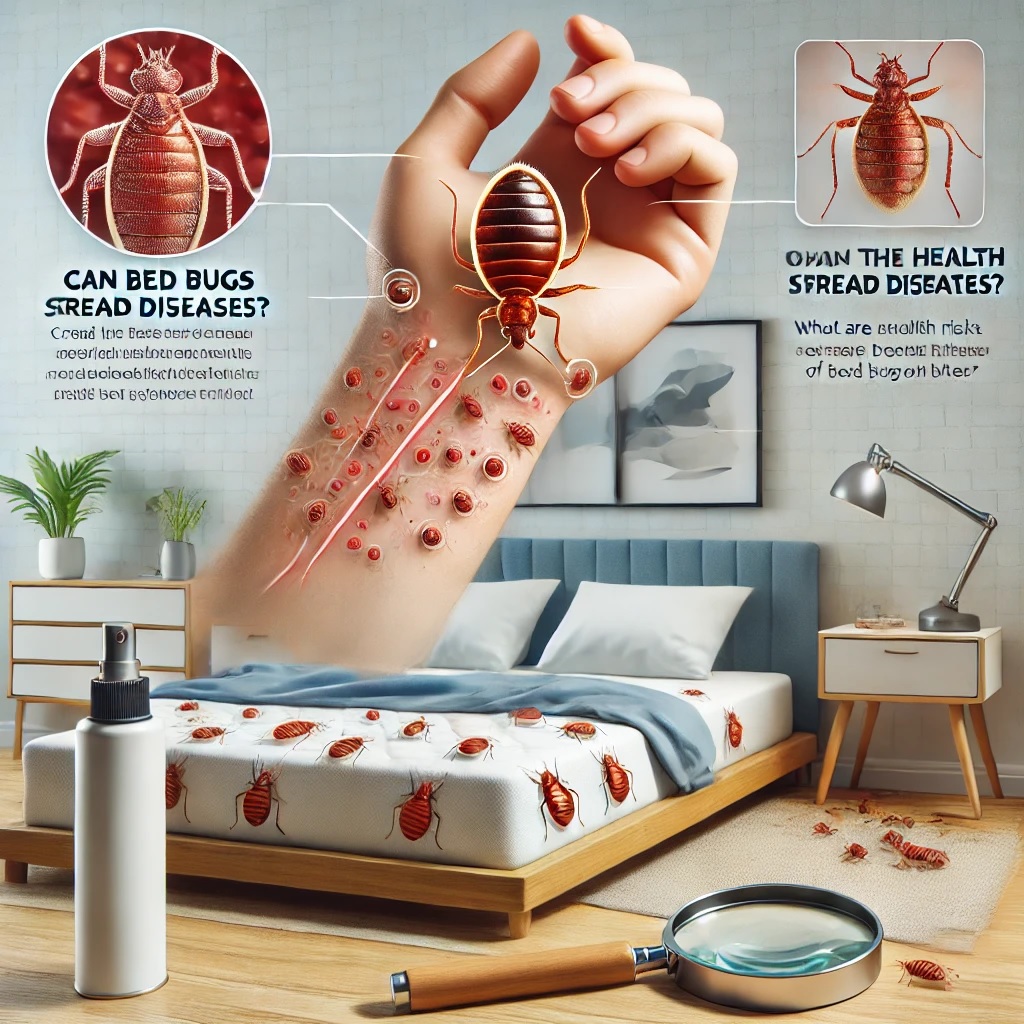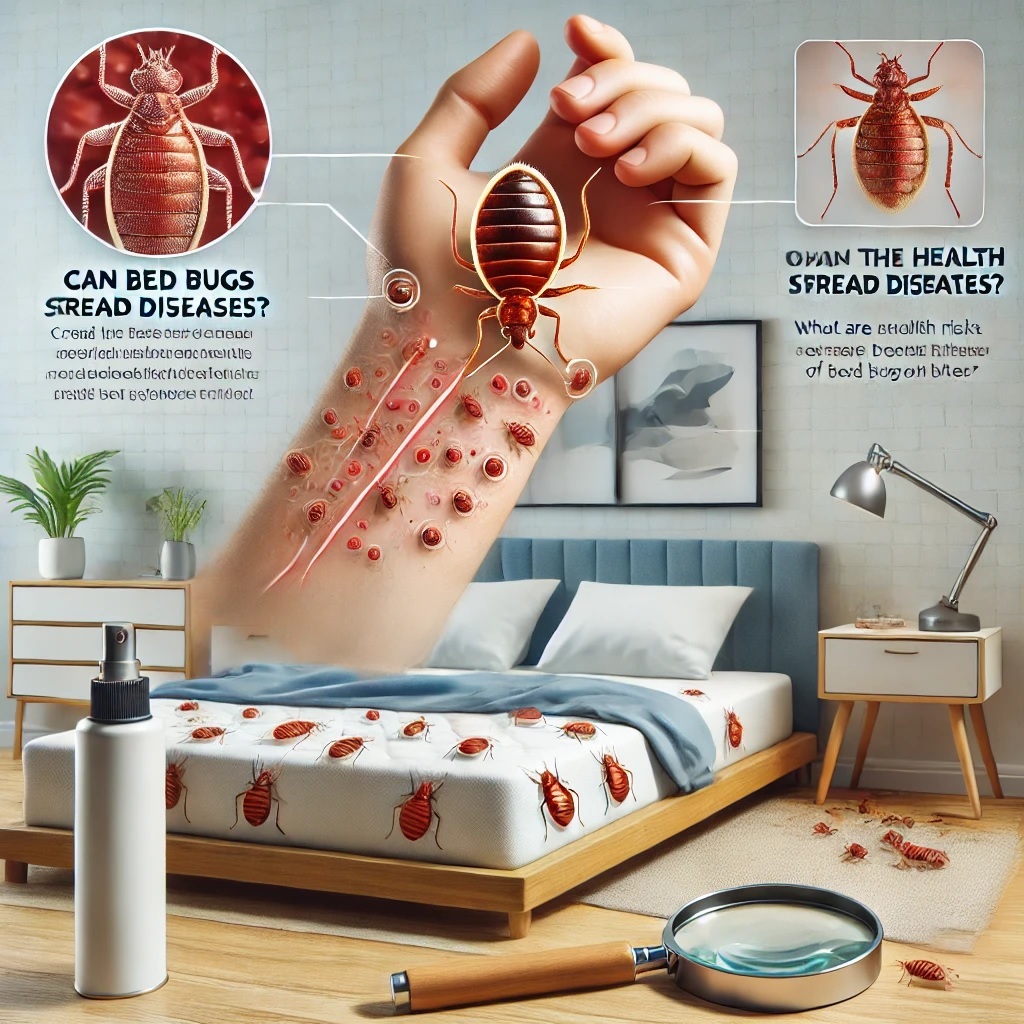Bed bugs—they’re the stuff of nightmares, aren’t they? Just hearing the name can make your skin crawl. These little pests are infamous for biting during the night, leaving itchy welts behind. But there’s one question we often hear at ThermoPest: Can bed bugs actually transmit diseases?
If you’re lying awake at night, scratching those bites, you might be wondering whether you’re at risk of catching something worse than an itch. Let’s clear up the myths and facts around bed bugs and disease transmission.

It’s understandable that people are concerned about the health risks of bed bug bites. After all, they’re blood-sucking pests like mosquitoes and ticks, which we know can spread illnesses. But here’s the good news: Bed bugs don’t transmit diseases like those other pests do.
That doesn’t mean they don’t cause problems, though. Bed bugs can still have an impact on your health and well-being, but not in the way you might think.
Bed bugs are parasites, feeding on human blood to survive. They’re sneaky, too—typically biting while you’re asleep and retreating to their hiding spots once they’ve had their fill. While they inject saliva into the skin during feeding, they don’t inject pathogens into our bodies like mosquitoes or ticks do.
Over the years, scientists have studied whether bed bugs could transmit diseases. Some lab studies have found that bed bugs can carry certain pathogens, like hepatitis B or Chagas disease, but here’s the key point: under real-world conditions, bed bugs haven’t been found to spread these diseases to humans.
Unlike mosquitoes, which transmit diseases like malaria or dengue, or ticks, which are known to spread Lyme disease, bed bugs simply don’t have the biological capability to pass illnesses to humans. So, while they can be a major nuisance, the risk of catching a disease from bed bugs is extremely low.
Now, just because bed bugs don’t spread diseases doesn’t mean they’re harmless. Bed bugs can cause several health problems—none of which you’ll want to ignore.
Bed bug bites leave behind itchy, red welts that can be incredibly uncomfortable. Some people react more strongly than others, with bites becoming swollen or inflamed. Allergic reactions can also occur in some cases, leading to more intense symptoms like blisters or hives.
One of the biggest risks with bed bug bites is the temptation to scratch, which can lead to secondary infections. Scratching breaks the skin and can open the door to bacteria, causing infections like impetigo or cellulitis. If the bites become infected, you might need antibiotics to clear them up, so it’s best to avoid scratching as much as possible.
Bed bugs don’t just affect your physical health. Living with an infestation can take a real toll on your mental wellbeing. At ThermoPest, we’ve spoken to many clients who’ve experienced anxiety, stress, and even insomnia because of bed bugs. There’s something about the thought of tiny bugs crawling over you at night that can make you lose sleep, both literally and figuratively.
So, can bed bugs carry and spread any diseases? While they’ve been found to carry pathogens in laboratory settings, these pests don’t appear to transmit them to humans in real-life conditions. Chagas disease is one of the illnesses often mentioned in this context, but the bed bugs we typically deal with in the UK aren’t known to spread it.
In labs, bed bugs have been exposed to pathogens, but when they’ve tried to spread those diseases to humans or animals in natural settings, they’ve failed. This makes bed bugs unique among blood-sucking pests. While they’re certainly unpleasant, they’re not known carriers of the diseases that we typically worry about with mosquitoes or ticks.
One theory is that bed bugs’ feeding habits simply don’t lend themselves to disease transmission. Unlike mosquitoes, which feed directly into blood vessels, bed bugs feed by piercing the skin and withdrawing blood. The way they interact with the bloodstream doesn’t allow pathogens to travel easily from one person to another.
Even though bed bugs aren’t spreading diseases, they can still have an indirect impact on your health in several ways.
Bed bugs can cause serious mental health strain, especially if the infestation is large or persists over time. Constantly worrying about being bitten, combined with the physical discomfort, can lead to heightened stress and anxiety. Some people feel embarrassed about having bed bugs, even though infestations have nothing to do with cleanliness.
Bed bugs are known for disrupting sleep, and it’s not hard to see why. If you’re constantly waking up with new bites, or even just worrying about being bitten, insomnia can become a real issue. Lack of sleep only adds to the stress and can leave you feeling run down and exhausted.
Unfortunately, there’s still a bit of a stigma around bed bugs. People worry about the perception of having bed bugs in their homes, which can make them feel isolated or ashamed. But the truth is, bed bugs don’t discriminate—they can turn up anywhere, and they’re just as likely to infest a clean home as a cluttered one.
The best way to protect yourself from bed bugs is to prevent bites in the first place. One of the most effective steps you can take is using bed bug-proof mattress encasements and regularly checking your home for signs of an infestation. If you notice any signs of bed bugs, like blood spots on your bedding or tiny black droppings, it’s important to act quickly.
Early treatment is crucial when it comes to bed bugs. The sooner you catch them, the easier it is to get rid of them. If you spot bed bugs or suspect an infestation, consider calling in a professional pest control service like ThermoPest. We can handle the problem efficiently, minimising the risk of bites and helping you reclaim your home.
If bed bugs are causing stress or anxiety, it’s important to address the emotional side of things too. Don’t hesitate to talk to someone—whether it’s a friend, family member, or professional—about how you’re feeling. Sometimes, just acknowledging the stress can make a world of difference.
If you’re dealing with severe allergic reactions to bed bug bites or you think an infection has set in, it’s a good idea to seek medical advice. Your GP can recommend treatments to reduce symptoms and help prevent further complications.
At ThermoPest, we specialise in bed bug treatment. If you’re struggling to get rid of bed bugs on your own or the infestation is too large to manage, we’re here to help. We use advanced methods to eliminate bed bugs and prevent them from returning, so you can get back to sleeping soundly without worrying about bites or infestations.
Can bed bugs spread diseases like mosquitoes or ticks?
No, bed bugs are not known to spread diseases like mosquitoes or ticks.
What health problems can bed bugs cause?
While they don’t transmit diseases, bed bugs can cause itchy bites, allergic reactions, and secondary infections from scratching.
How can I prevent bed bug bites?
Using mattress encasements, regularly inspecting your home, and calling professionals at the first sign of an infestation are the best ways to prevent bites.
Is there any risk of disease from bed bug bites?
No, there’s no evidence to suggest bed bug bites can spread diseases.

While bed bugs aren’t responsible for spreading diseases, they can still cause a fair amount of discomfort and stress. The itching, the potential for infections, and the impact on your mental health are all reasons to take an infestation seriously. If you’re dealing with bed bugs and need help, ThermoPest is just a phone call away. Let us help you get rid of the problem so you can get back to enjoying your home—bite-free!